This year’s Earth Day campaign theme “Planet vs. Plastics” focused attention on the growing problem of plastic waste and pollution, especially microplastics in our oceans and drinking water. As awareness grows, so does consumer demand for more sustainable products and practices.
Offering eco-friendly options is not just the right thing to do, it’s good for business. Recent PPAI research revealed that more than 8 in 10 Gen Zers consider environmental impact when using promo products, and as the buying power of this cohort grows, brands should focus on the environmental footprint of their goods, including packaging and useful life.
RELATED: Sustainability Sells: 3 Distributors Tell Us Why They Emphasize Eco-friendly Promo
Ask The Right Questions
Elizabeth Wimbush, PPAI’s director of sustainability and responsibility, says the most important questions to ask when considering the sustainability of products are:
- Is this useful, durable and designed to last?
- What materials are used in the product and are they renewable? Responsibly sourced?
- Was the product made with ethical considerations in mind?
- Is it designed for easy disassembly, recycling or composting at the end of its life?
- Is there a more sustainable alternative to the product that serves the same purpose?
That first question may be the most important for both sustainability and branding impact. After all, the best promo product is the one that’s kept and used.
“Having long-lasting products that are used is a huge part of sustainability,” says Denise Taschereau, CEO and co-founder of Vancouver-based distributor Fairware and chair-elect of the PPAI Board of Directors. “No sense in selling cheap products destined for landfill, even if they’re made from recycled materials.”
Lauren Piller, marketing director for Texas-based distributor Eco Marketing Solutions, also focuses on material sourcing and end of life when considering products. “Understanding the origins of materials helps assess their environmental impact, including factors like deforestation, pollution and habitat destruction,” she says. “Understanding how a product can be disposed of responsibly helps minimize its environmental footprint and promotes circularity in the supply chain.”
ICYMI: Recycling 101: What You Need To Know
Kara Keister, MAS, owner and promise keeper at Ohio-based distributor Social Good Promotions, asks suppliers if goods are made in a facility with specific ratings like EcoVadis status. She also says it’s important to engage clients in the sustainability conversation and created a checklist with questions to ask during the sales and planning process, including:
- What promo products best fit the vision of your marketing campaign?
- Does the product fit the brand (i.e., power, durability, luxury)?
- Are there core company values we can align with through product selection?
- How will the end user utilize the product?
When sourcing products, look for items that come with third-party verification such as the Global Recycled Standard or the Recycled Content Standard. Also, don’t assume that recycled products or those made from wood or paper are automatically eco-friendly.
“You have to be really cautious about what adhesives and chemicals were used to bind them all together, because then you’re running into formaldehyde issues,” says Brianna Mazze, vice president of compliance and sustainability at Ontario-based supplier St Regis Group. “Just because something’s made from wood or bamboo doesn’t necessarily mean it’s sustainable. That’s only half the battle. You need to know where it was sourced, how it was made, what chemicals were used and what adhesives were used to create that end product.”
RELATED: 4 Ways Your Eco-Friendly Marketing Strategy Can Backfire
Also be sure to ask about the packaging, says Britney Keiser, an account manager with Ohio-based distributor City Apparel + Merch. Is it recyclable or biodegradable? Can you skip the polybag? For example, St Regis Group converted its trademark black boxes to 100% recycled content in the past year and new supplier Rupt, based in Texas, designed its packaging to transform into an ancillary product that enhances the recipient’s experience.
Below are a dozen eco-friendly products to consider for your next project, recommended by promo pros. These are just a handful of the innovative and sustainable products currently available in the industry, with more sure to come.
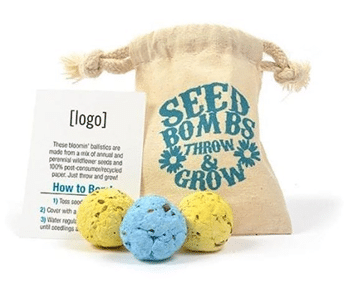
Taschereau loves the Seed Paper Bomb Bag (3 Pack), a silkscreen bag with a custom-printed instructional insert card (recycled cardstock) and a mix of annual and perennial wildflower seeds. Just throw and grow (with consistent watering). “Such a fun gift,” she says, “and the idea of bombing with wildflower seeds is a refreshing thought.”
Bloomin Promotions / PPAI 216914, Standard-Base
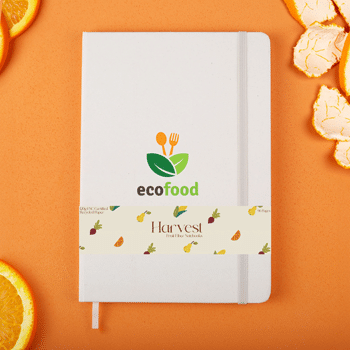
Stand out at conferences and conventions with a Harvest Fruit Fiber Notebook that features a cover crafted from recycled fruit fibers and 96 lined pages of 100% recycled paper. This products is part of the carbon-neutral supplier’s Goods2Know portfolio. Choose from kiwi (green), citrus (orange), hazelnut (tan) or almond (brown).
HPG / PPAI 110772, Platinum
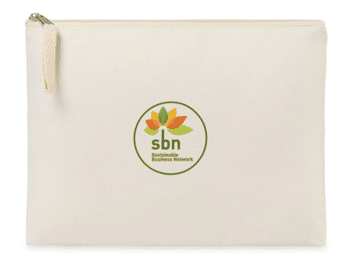
Keiser says she is “currently obsessed” with the Aware Recycled Cotton Zippered Pouch. “Definitely a travel must have! Shove all the cords you’re traveling with in this pouch and they won’t get lost or tangled,” she says. Scan the QR code inside the pouch to view the digital product passport from Aware (a PPAI business service member) that allows the end user to track and validate textile impact metrics using blockchain technology to certify the data through the whole supply chain.
Gemline / PPAI 113948, Platinum
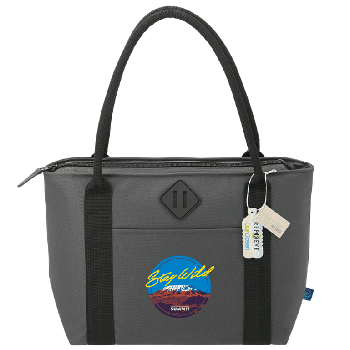
Save the ocean one bag at a time with the insulated Repreve Ocean 12 Can Tote Cooler, made from recycled ocean plastic. Through a partnership with 1% For The Planet, 1% of sales of this and all EcoSmart products are donated to environmental nonprofits. “What PCNA has committed to as an organization is commendable,” says Keister. “The ease with which our team can search the PCNA website and find product that checks the eco-friendly and sustainable box, then subsequently share client-friendly versions of that curated product, is such an efficient solution.”
PCNA / PPAI 113079, Platinum
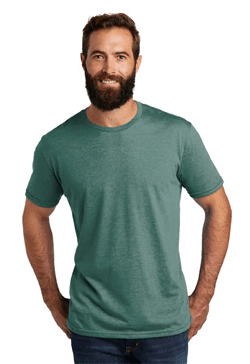
Taschereau and her team are big fans of Allmade Apparel, especially the company’s impact calculator. This carbon-neutral Unisex Tri-Blend Tee, made of 50% polyester from recycled plastic bottles, 25% organic cotton and 25% Tencel modal comes in 22 colors and sizes XS-4X. Each super-soft tee uses an equivalent of up to six recycled plastic water bottles, saves an average of 145 gallons of water and reduces 4 kg of CO2 emissions.
Allmade Apparel / PPAI 743984, Standard-Base
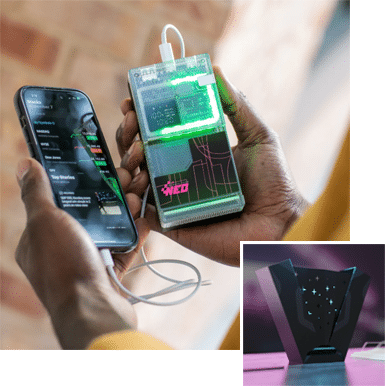
The Elexa Powerbank, made from 100% recycled plastic, offers serious charging capacity with 20000mAh, and the intuitive LCD indicator keeps users informed of remaining capacity and discharge time for its two USB C and one USB A ports. It also offers a 2-in-1 promo gift, as the packaging transforms into a night light, “Great design, the packaging has a second function, and you can get all the stats on its component materials and carbon footprint on the product page,” says Wimbush.
Rupt / PPAI 826757, Standard-Base
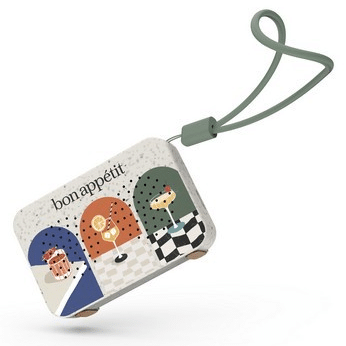
Piller says this Presto Eco Eco-friendly Pocket Sized Speaker PowerStick.com “perfect for summer pool parties and traveling while staying stylish and being sustainable.” Measuring less than an inch thick with a convenient wrist strap, this Bluetooth speaker is ready to go anywhere. It’s made from a blend of materials including post-consumer recycled plastic, wheat straw and cork, and a tree is planted with every order placed.
PowerStick.com / PPAI 383252, Gold
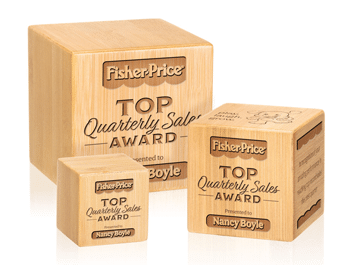
Make recognition fun and eco-friendly with a Kenilworth Cube Award, crafted from responsibly grown, ethically sourced FSC-certified bamboo and nontoxic adhesives. Choose from laser engraving, laser with one color or full-color VividPrint (second position engraving optional) and three cube sizes: 2×2, 3×3, 4×42-inch, 3-inch or 4-inch.
St Regis Group / PPAI 230188, Platinum
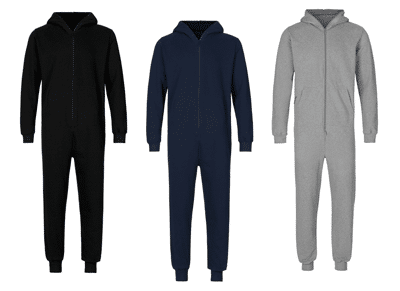
Looking for something different in the apparel category? Get cozy with this hooded Unisex Jumpsuit with kangaroo pocket and double slider zipper. Made from combed and ring-spun fleece with a brushed interior, it comes in three colors and sizes XS-3X. “How cool is this?” says Wimbush. “It’s 100% organic fair-trade cotton with all the certifications you could want.”
Organic Tee Star / PPAI 821574, Standard-Base
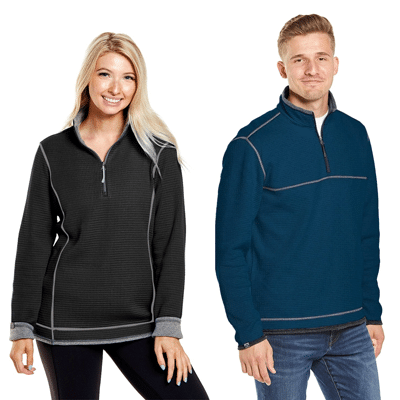
Quarter zips and other pullovers are perennial favorites in promo, and the Maverick Quarter Zip offers modern style with a touchable waffle texture (with a soft jersey lining) and contrast seam detailing. Each garment contains more than 12 recycled bottles. Available in four colors in men’s S-5X (and up to 3X tall) or women’s XS-3X.
Storm Creek / PPAI 438091, Gold
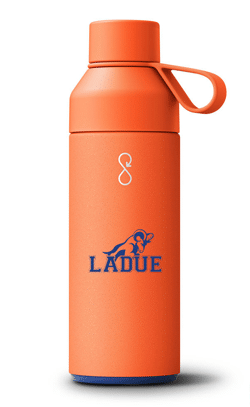
Every sale of an Ocean Bottle, like this Ocean Bottle OG 17 oz., funds the collection of roughly 1,000 plastic bottles before they reach the ocean. It’s 100% dishwasher safe, made from recycled stainless steel, double-wall vacuum-insulated, sweat-proof and leak-proof, and it keeps liquids hot or cold for six hours.
St Regis Group / PPAI 230188, Platinum
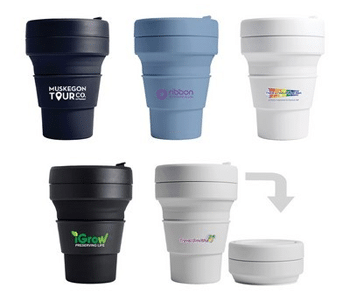
Be ready to enjoy a beverage almost anywhere with a collapsible Stojo 12 Oz. Cup (Full Color Digital), available in five colors. Not too big, not too small, it’s just right to take with you everywhere, fits standard cupholders and is dishwasher safe. The silicone cup and tab are certified food safe by the German LFGB standard (stricter than FDA). No BPA, phthalates, leads or glues.
AAkron Line / PPAI 111082, Gold
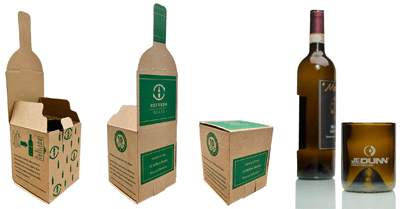
Keister loves to present this Single 12 Oz. Mixed Color Glass With Engraving to clients. “The packaging tells the story, so not only is your client choosing a circular product, the end user understands the impact of the branded gift they just received,” she says. Each glass is created from a wine bottle collected from local bars and restaurants, working toward the company’s 10 Million Bottle Rescue Mission. The bottles are cut and the glass melted to create a smooth, even rim, and the final step makes the glasses dishwasher safe.
Refresh Glass / PPAI 757521, Standard-Base
Tell Your Sustainability Story
Messaging matters, but take care to avoid greenwashing or inflating eco-friendly claims about a product. That said, consumers increasingly want to know how the products they buy affect the planet, so be sure to tell your sustainability story.
For example, apparel made using recycled plastic often comes with a tag saying how many water bottles that garment diverted from the waste stream. Technically, the recycled content is measured by weight, not each recycled piece that went into it, but it’s much easier to picture half a dozen water bottles than a pound of plastic pellets.
“It’s more of a marketing thing, and that’s OK,” says Mazze. “It gives people the visual of that impact rather than saying the weight, which you can’t visualize.”


